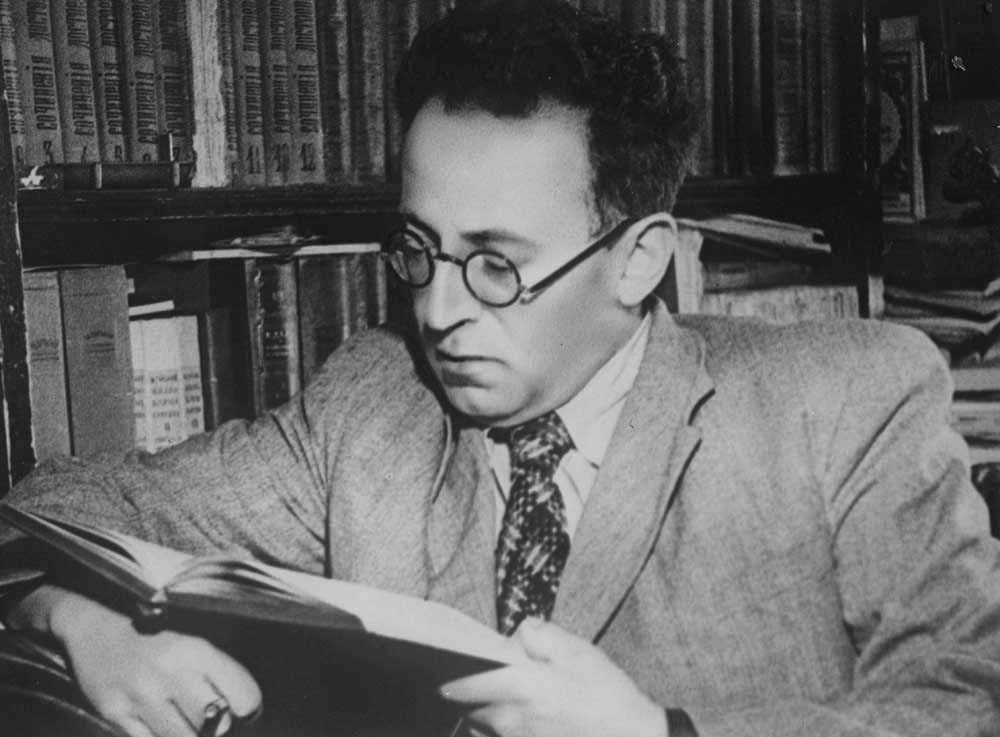Another review of Forever Flowing, albeit I don’t know the publication in which this item actually appeared! Brief like Thomas Lask’s 1 April 1972 review in the New York Times, this anonymous reviewer focused upon the book from a literary – and thus not too complimentary – vantage point.
________________________________________
Synthesis with Slaves
VASILY GROSSMAN
Forever Flowing
Translated by Thomas P. Whitney
217 pp Andre Deutsch £ 2.25
February 23, 1973
 (Photograph accompanying “Stalingrad“, by Vasily Grossman, at Granta, November 15, 2018.)
(Photograph accompanying “Stalingrad“, by Vasily Grossman, at Granta, November 15, 2018.)
Vasily Semenovich Grossman was an important Russian writer, little known in the West, who was born in 1905, established himself as a novelist before he was thirty, and became famous during the Second World War for some impressive works of reportage and for a novel, The People Is Immortal, which rose above the prevailing level of social patriotism. Despite his considerable contributions to Soviet literature, however, he got into trouble towards the end of Stalin’s life, when his old play If One Believes the Pythagoreans and his new novel, For The Just Cause, were suppressed. After Stalin’s death he spent several years writing a bitterly subversive book called Everything Flows, which couldn’t possibly be published in Russia and was smuggled abroad after his death in 1964. It was published in Germany in 1970, and now appears here in a very stiff American translation.
The new title, Forever Flowing, is rather misleading. Grossman was of course quoting one of the old Heraclitan tags, which is repeated in the book, together with a grim parody of another instead of “You cannot step into the same river twice.” He says, “You cannot get into the same prison train twice.” The whole book, in fact, is permeated with the metaphysical ideas attributed to Heraclitus more than 2,000 years ago; and, while this destroys its literary quality, it gives it a special historical and philosophical interest.
Everything Flows is not really a novel – or rather, it begins as a novel, describing one of the “Returners” (возвращающиеся – vozvrashchayushchiesya) a man who has come back from the labour camps after thirty years and finds that everything has flowed, everyone has changed, and the revolutionary enthusiasm of the old days has turned into sour disillusion and narrow careerism; but it soon breaks down into a series of semi-fictional stories about various aspects of the Stalinist dictatorship which are never properly drawn together but are linked and eventually overshadowed by a long meditation on the meaning and purpose the phenomenon of Stalinism.
Grossman is remarkable among Soviet writers fur seeing this not as some kind of error in development or interruption of progress hut as an essential culmination of the whole course of Russian history. He sees Stalin as the true successor of Lenin, and Lenin as the destroyer of the liberty which had become possible for the first time in 1917. Lenin is indicted for creating a synthesis of “socialism and unfreedom”, which derives from the Tsarist tradition of progress plus serfdom, embodied above all by Peter the Great. This is a familiar theme in the West, but in Russia it is rank heresy, and it would be interesting to know in what circumstances Grossman came to such a conclusion.
Some of the stories have considerable power, especially those about Masha, the wife of an arrested man who is arrested in turn and suffers and dies in the camps, and about Anna, the Party activist who witnesses the Ukrainian famine at the beginning of the 1930s during the compulsory collectivization of the land. But the main story, about Ivan, the hero whose life has been ruined by the regime, is weak, and the whole hook leaves an impression of artistic confusion mixed with intellectual conviction of a disturbing kind.
Everything flows, and yet remains tile same: tyrannies rise and fall, but tyranny lasts forever. Grossman hints that liberty will come in the end, but it is hard to see how this fits into his scheme, and the terrible vision of Russia enduring perpetual slavery is the most striking feature of the hook. It is a pity that, in spite of the time he spent on it, Grossman didn’t manage to make it as good as it deserved to be.
Suggested Readings
